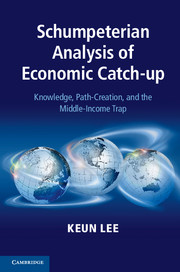Book contents
- Frontmatter
- Contents
- List of Figures
- List of Tables
- Foreword
- Preface
- Part I Introduction and perspectives
- Part II Empirical analysis at three levels
- Part III Toward a theory and how to escape the trap
- Part IV Technological turning points and conclusion
- 9 Hypothesizing a theory of technological turning points
- 10 Summary and concluding remarks
- Appendix tables
- Notes
- Bibliography
- Index
9 - Hypothesizing a theory of technological turning points
from Part IV - Technological turning points and conclusion
Published online by Cambridge University Press: 05 June 2014
- Frontmatter
- Contents
- List of Figures
- List of Tables
- Foreword
- Preface
- Part I Introduction and perspectives
- Part II Empirical analysis at three levels
- Part III Toward a theory and how to escape the trap
- Part IV Technological turning points and conclusion
- 9 Hypothesizing a theory of technological turning points
- 10 Summary and concluding remarks
- Appendix tables
- Notes
- Bibliography
- Index
Summary
Introduction
This chapter addresses a number of issues that remain to be discussed on the topic of specialization in short-cycle technologies. The first has to do with whether a single variable of cycle times of technologies can sufficiently explain the complex process of technological development. The second is the generalizability of the technological turning point phenomenon, specifically whether this turning point can and should occur in every successful catching-up economy. Given that the curve of cycle time always exhibits short-term vertical fluctuations, a third question that remains to be answered is how to ascertain whether an economy is in fact experiencing such a turning point. Finally, specialization in short-cycle technologies may not be the only path toward successful technological development for latecomers and a closer consideration of alternatives is in order.
A single-variable theory?
Given this book’s heavy emphasis on the cycle time of technologies, one may wonder whether, as a single variable, cycle time can sufficiently explain the complex process of technological development. However, cycle times reflect changes in many other aspects of technological development, and as an explanatory variable, it performs much better than alternatives in the literature such as technological opportunity. In the remainder of this section, we discuss the relationship of cycle time to other variables including technological diversification, localization of knowledge creation, and technological opportunity.
- Type
- Chapter
- Information
- Schumpeterian Analysis of Economic Catch-upKnowledge, Path-Creation, and the Middle-Income Trap, pp. 207 - 222Publisher: Cambridge University PressPrint publication year: 2013



